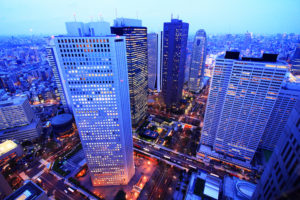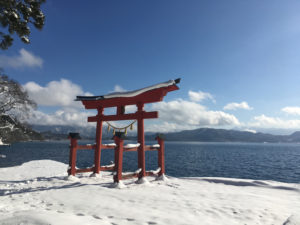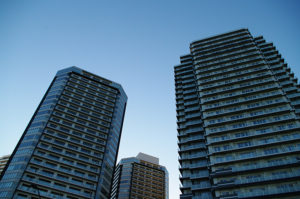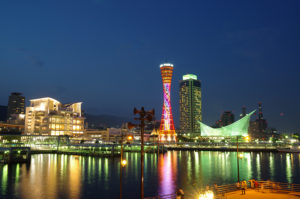Japan has the risk of earthquake.
You remember the earthquake in Kobe in 1995 and Tsunami disaster in Fukushima in 2011.
Although Japan’s earthquake-resistant technology of buildings is considerably advanced than that of other countries,
we have to be realistic.
In the interest of personal safety and protecting the value of what is likely your biggest financial asset,
prospective buyers and investors should be aware of any natural disaster risk impacting a potential property purchase.
If the building is broken or collapsed due to an earthquake, you cannot get rent.
In most cases, learning about natural disaster risk will not stop investment, but it will help investors make a better-informed decision about where to buy and preparing in terms of appropriate insurance coverage depending on the type of natural disaster risks most affecting the property.
Unfortunately we don’t have a comprehensive ‘natural disaster risk score’ covering whole Japan announced by the government or a certain institute but on the prefecture and city level, many prefectures and cities
release ‘hazard maps’ to show the risks of natural disasters
in the area.
Read more
Monthly Archives: February 2018
Unpaid rent risk : Risks in private real estate investment in Japan (Part3)
Obviously, getting tenants is a prerequisite for making money from your rental property. However, getting just any tenant does not guarantee your investment.
If you get bad tenants, you run the risk of your rent not being paid on time while repayment for loan and maintenance costs being accumulated.
Additionally, depending on how bad your tenants are, your rental property might get more damaged that normal use.
If you have a really bad tenant, you might even have to deal with an eviction.
Today I will discuss the risk of rent being unpaid and how to eschew the risk.
If you own investment real estate, there are expenses you have to pay monthly.
・Payment of administrative expenses · repair and maintenance.
・Monthly repayment for loan
If there is rent income properly every month
you can pay the above cost from the rent, but once the rent is unpaid your income statement will become negative.
How to deal with unpaid rent ?
Is it the good time to buy a property in Tokyo ? – Quick recapitulation on condominium market in Tokyo in 2017-
Tokyo kankei (Japan’s institute for real estate study) recently announced
the market report on the condominiums in greater Tokyo area.
We have made the recapitulation of the report for the clients.
I will share a part of our report today.
Both prices of newly built second-hand condominiums and
unit price per square meter has gone up.
New construction projects were supplied mainly in central area of Tokyo
which sharply makes price rise.
The average price in the Tokyo metropolitan area (Tokyo and neighbouring cities) of newly built condominiums was 55.44 million yen, up + 9.0% from the previous year’s 50.87 million yen.
Because it was falling the previous year, it rose for the first time in two years, and the
whole metropolitan area shows a trend of rising again from a high stop.
The reason for price rise was due to the strong tendency of supply to concentrate in central Tokyo.
The average area for each condominium was 63.24 square meters, which was up 3.1% from 61.33 square meters in the previous year.
How safe is Japan to invest ? and which part of Tokyo you should consider ? -crime rate-
Do you want to buy a house or invest in Japan ?
If you’re considering an international investment property, step one is to find a good real estate agent who understands the country’s regulations,
especially if you’re not fluent in the local language.
Next question is what sort of criteria for judgement do you have in your mind for finding a property ?
If you don’t know what you’re looking for, you’ll never find it.
How about crime rate ?
Good.
Japan is safe.
Having lived in Kobe, Kawasaki, Tokyo, Sydney, Gold Coast, London
and travelled over 25 countries, I can assure it. And crime rates are an important indicator to analyze when looking for an investment property.
Buying the property in a high crime country or area can be risky not only to you, but also to your investment or even to your tenants.
High crime generally reduces the values of properties in a given area.
A study in USA for example, found that a 10 percent reduction in homicides resulted in an 0.83 percent increase in housing values the following year.
Needless to say, people in Japan do care about the safety in the neighborhood.
I am not saying that you can’t make money in areas with higher crime.
There could be a good number of investments in areas with a relatively high crime rate. There are still?plenty of good people in those areas that you can make money renting or selling to.
But the important thing is to know what you are getting into.
It is important up front to decide what kind of risk tolerance you have and what types of areas you are willing to invest in.
But how safe is Japan ?
Once you’ve decided on what kind of areas(countries) you are looking to invest in,
you can start to research them. Always ask Google first.
Here is the some statical data on some developed countries by UN, GLOBAL STUDY on HOMICIDE 2013.
How can you know if your property in Japan is a good investment ?
There are a number of options and variations in the real estate investment opportunities in Japan.
You can invest in the condominiums, residential buildings, flipping the existing houses, flipping the abandoned houses, office buildings
boutique hotels and small hostels so on.
You also have to decide the area you want to invest.
Is it in Tokyo, neighboring areas of Tokyo or local cities which usually offer more attractive yields ?
Each option has both pluses and minuses.
In this article today, however, I will discuss in general what I think a good rental property is and what things to look at when you are considering buying a property for the investment in Japan.
In my opinion, you need to consider the following factors.
Monthly cash flow, the location, the value (appreciation), the condition of the property, the market and your age.
Taxes and other factors need to be considered as well.
Understanding the tax angles when you buy the property in Japan Part-1
Understanding the tax angles when you buy the property in Japan Part-2
Brief on Inheritance tax in Japan as of 2017
Among the above factors, the first thing I look is the monthly cash flow.
High yielding, guaranteed rent should be too good to be true ?: ‘Kabocha no basha’ subletting problem in Japan

Pitfall of sub-leasing(sub-letting) real estate investment
High yielding, guaranteed rent(sub-leasing) should be too good to be true ?
Recently one of the scandals which rattled the industry is KABOCHA-NO-BASHA
(Pumpkin Carriage) problem.
The background of the scandal is as follows.
Investors were guaranteed a fixed monthly amount over an extended period if they invested money by contracting with a real estate company called Smart Days(Tokyo)
that used the funds to set up and manage share house facilities under sub-leasing agreement.
Since 2015, Smart Days, operator of women-only share houses called Kabocha no Basha (Pumpkin Carriage), has promoted high yield investments through the media and has mainly acquired customers of office workers. In the sub-leasing contract, rent payment collected through the sub-leasing is sought to pay back the debt for a long period plus small profit.
For example, suppose you borrow 100 million yen from a bank and the monthly repayment amount is 500,000 yen, if you earn rental income of 550,000 yen a month, it will generate 50,000 yen a month profit. This system is typical leveraging in the real estate investing and there is no red flag about it.
In an ideal setting, Smart days as the sub-leasing company would rent out rooms to tenants and bring in a steady and continuous supply of rent, a portion of which would go to the investors.The shared house with shared toilets and bathrooms is not as wide as 7 m² in living space, but the initial cost of moving in is kept low (so they say), and it was expected that more women moving into Tokyo from rural cities will choose to stay in these share houses.Smart days also promoted the business to support tenants finding a job (This is an alarming part)
What is the 2022 problem in Tokyo property market ?
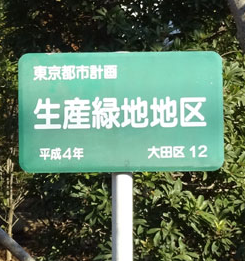
Some critics in the industry are predicting the price of condominiums in Tokyo shall drop soon simply because they are too expensive for people to buy.
According to Nikkei in December 2017, the average price of a newly built condo in the capital region — Tokyo and the surrounding prefectures of Kanagawa, Saitama
and Chiba — rose 7.6% in 2017 to 59.08 million yen ($533,000).That was higher than the average in 1989 and 1991 and the second-highest level ever,
trailing only the 1990 record by 2.15 million yen.
Are condominiums really too expensive ? Are those critics are right ?
We need a crystal ball to predict the future
but today I am going to discuss the reason why the price of condominiums may go down.
Personally though, I am still mildly bullish about the market right now due the global aspect (see below UBS report)
and the healthy growth of the secondhand condominium market.
It is always to good to listen to the people with different opinions.
Let’s listen to what critics have to say.
We saw the condominiums developers go bankrupt one after another in the recession after the global financial crisis in 2008.
Nonetheless, the current price of newly built condominiums in greater Tokyo area has risen up sharply over several years and they are becoming more and more unaffordable for average salaried workers.
In the latest Tokyo kantei report in 2017, the average price of new condominiums are about 8-10 times higher than average annual income of the skilled workers in greater Tokyo area.(vs. 14 times in London)
London house price
The reason for raising is not because real demand is strong because everyone wants to buy them.
Read more
Vacancy risk: Risks in private real estate investment in Japan (Part2)
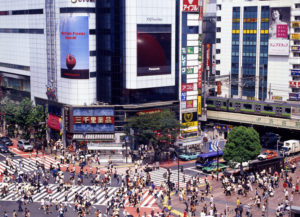
Vacancy risk
Previously I discussed the defect risks when you acquire the property.
Today I will discuss the risks while you are owning the property.
In fact, there are several challenges while you own and manage the property.
Vacancy is one of them.
Vacant rooms obviously do not generate any income so it is very important
to fill your property (whether it is a rental house or a small multiunit rental property) with good, rent-paying tenants.
However in practice, you will see vacant rooms for certain time period over the years and there are tenants who don’t honor the leasing contract.
Let’s look at the ‘vacancy risk’ and how to mitigate such risk.
The beauty of real estate investment in Japan is that your can expect very
stable income every month. Rents are usually paid monthly.
Therefore finding stable trustworthy tenants is a key for success.
However, due to certain reasons such as inconvenient location of the property,
Investors may face the situation where the property being vacant.
If your occupancy rate is very poor, you may have the problems to pay back
the loan. That is the ‘vacancy risk’.
Hidden Defects : Risks in private real estate investment in Japan (Part1)
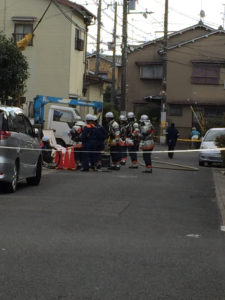
There are risks associated with any investment – loss of capital, finance, leverage and liquidity risks and so on.
Not like buying the paper assets such as REITS, many of these are only relevant to the direct investment (where the investor invests, owns and has control over the real estate asset).
This article will highlight the main risks associated with investing in real estate in Japan and provides commentary on how to analyse and mitigate these risks.
Today I am going to discuss the risks at time of acquisition.
Unlike regulated industries such as accounting and financial planning, working for a property company (as distinct from working as a traditional real estate agent),
does not require a great deal of education, experience, or study prowess. Marketing investment property requires nothing really but the ability to sell.
That is one of the reasons why there are unlicensed (often rogue )
‘property consultants’ in Japan.
Engaging in the marketing activity to lure the investors without holding a license is against the
Building Lots and Buildings Transaction Business Law. If your consultant or agent do not hold
the license, your contract is not protected by the said law.
For more information, please see my post on February 11, 2018.
Are there any rogue real estate agents in Japan ?
At the end of the day, even the good agents cannot guarantee the success of the investment and thus investors must learn the risks and returns
before they make a investment.
Good opportunities ? : How does the booming inbound tourism impact the property market ?
Japan is enjoying very healthy growth of inbound tourism.The number of inbound tourists, which stood only at 8.36 million in 2012, set record highs for the sixth year in a row. It continues to thrive as a record 28.7 million tourists visited Japan in 2017, up 19 % from the previous year. In 2016, it was up 21 % and in 2015, up 47 %.
Visitors from China, South Korea, Taiwan and Hong Kong account for more than 70 % of the total number.
The number of Chinese travelers grew 15% to 7.35 million, South Korea increased 40 % to 7.14 million.
2018 January number will be announced on February 16 but apparently it is keeping the nation on track for the government’s target of boosting the annual number of visitors to 40 million in 2020.
There are some challenges, however, that must be overcome, such as a tight supply of accommodations that cater to overseas guests and a heavy concentration of visitors from East Asia.
Further efforts should be made to realize the full potential of inbound tourism as one of the nation’s key growth industries including welcoming more American and European visitors
who have a tendency to stay longer with bigger spending budgets.
(Chinese tourists spend less than Europeans and Americans on accommodations and foods)
Japanese people are regularly talking about the latest inbound tourism booming but how does the industry look more in the global perspective ?
Is only Japan performing well ?
In order to analyze the Japan in the global market, let’s look at the 2017 report published by UNWTO (UN World Tourism Organization).
Read more

